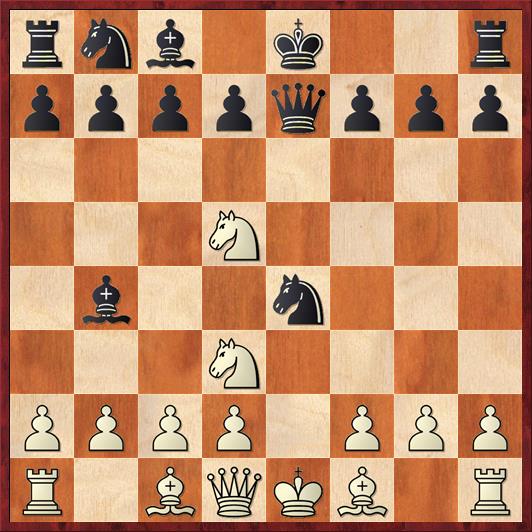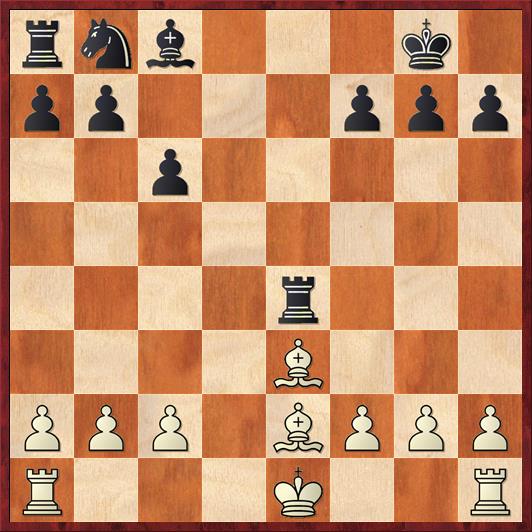A few years ago I wrote a post about a game where my opponent resigned in a drawn position. I mean really, truly drawn: I had just sacrificed a queen to force a perpetual check, but he somehow misread it and thought it was a checkmate. Of course, there have been even worse cases in chess history — games where people have resigned in winning positions. I’ve never had one of those.
However, there is another kind of premature resignation: throwing in the towel in a position that is bad but still not a forced loss. In this kind of position, it’s really all about psychology and fighting spirit. How much suffering are you willing to tolerate? And are you able to keep looking for tactics and opportunities even in a position where you’ve messed up?
Usually I have pretty good fighting spirit. But here is one game where it totally deserted me. It’s the shortest game that I ever lost.
David Blohm – Dana Mackenzie
CalChess Labor Day Championship 1998
I went into this game already a little bit discouraged. It was a six-round tournament. It was the fifth round and I had yet to win a game. The previous rounds had gone half-point bye, loss, draw, loss. My opponent in this round was a very solid master with a somewhat stodgy, “old man” opening repertoire.
1. e4 e5 2. Nc3 Nf6 3. Nf3 Bb4?!
This is actually a perfectly good move, but psychologically it was a terrible mistake. I didn’t want to go into the “boring” Four Knights Game against a “boring” opponent. Instead, I played a move that I had seen mentioned in Modern Chess Openings but that I had never actually studied.
This was bad psychology on two counts. First, it is in no way true that we are condemned to a “boring” game after 3. … Nc6. Things can get very interesting after 4. Bb5 Nd4, the Rubinstein Variation. Second, playing a move that you have never played or studied, against a very seasoned master, is a recipe for disaster. Especially in double e-pawn openings, which can get tactical in a hurry.
4. Nxe5! …
And now I am totally, completely out of my personal book knowledge.
4. … Qe7
Probably more in the spirit of things is 4. … O-O, but mentally I wasn’t ready to play a pawn down in an unknown position — even though it’s quite a promising pawn sacrifice.
5. Nd3 Nxe4??
Yes, this is a blunder. But no, it’s not the kind of game-ending blunder I thought it was. Black should play 5. … Bxc3 6. dc, and now after 6. … Qxe4+ 7. Be2 O-O White has at best a tiny advantage due to the two bishops. Or Black can play more ambitiously with 7. … Qxg2?! 8. Bf3 Qh3, when White has a lot of compensation for a pawn but it’s nevertheless a tense, unclear position. People who enjoy defending a long time in order to win in the endgame should like that variation; I probably wouldn’t enjoy it.
6. Nd5! …
 Position after 6. Nd5. Black to move.
Position after 6. Nd5. Black to move.
FEN: rnb1k2r/ppppqppp/8/3N4/1b2n3/3N4/PPPP1PPP/R1BQKB1R b KQkq – 0 6
This move hit me like a ton of bricks. None of the usual tricks work. After 6. … Nc3+ 7. Nxe7 Nxd1 8. Nxb4 Black’s loose bishop drops off. After 6. … Qe6 7. Nxc7+ the queen is gone. On “normal” moves, White wins a piece (or so I thought) on b4. I was looking at the cheerless prospect of getting maybe one pawn at most for a piece, and playing on for 30 more moves against a master whose forte was steady, rock-solid chess. No thanks, I thought. Therefore:
6. … Black resigned?
It was only several days later that I realized that Black doesn’t lose a piece. At most, I might have to give up a pawn, and that is hardly worth resigning over. The key point is that after 6. … Qd6! 7. N5xb4 a5, the b4 knight has no flight squares. If 8. Qe2 Kd8! White can’t take on e4 because 9. Qxe4?? Re8! wins the queen.
Somewhat better for White is 6. … Qd6 7. N3xb4, but he still can’t hold onto both knights after 7. … c6. My post-game analysis went 8. Nc3 Qxb4 9. Qg4 with advantage to White, but in the one game on ChessBase where this actually occurred, White’s advantage is minimal. Elizabeth Paehtz versus Thomas Pattard, Dresden 2002, went 9. … O-O 10. Qxe4 Qxe4+ 11. Nxe4 Re8 12. d3 d5 13. Be2 de 14. de Rxe4 15. Be3 (see figure).
 Position after 15. Be3 (analysis). Black to move.
Position after 15. Be3 (analysis). Black to move.
rnb3k1/pp3ppp/2p5/8/4r3/4B3/PPP1BPPP/R3K2R b KQ – 0 15
White has an advantage thanks to the two bishops and she eventually won, but I think that was in part due to being a better player than her opponent (rated 2320 versus 2195). Certainly if I had been told on move 6 that I could reach this position as Black, I would have been thrilled!
The computer (Rybka) says that White should have played 8. Ne3! rather than 8. Nc3 and this leads to a rather large advantage, because in the variation above a knight on e3 would have been able to jump to f5, creating a mate threat on g7. But here we are starting to get into computer versus human play. Would Blohm have been able to see 8. Ne3 and understand why it was better? A strong 2300 player like Paehtz didn’t. Certainly it would have been worth playing on to find out, instead of resigning on move 6.
I think it’s quite interesting to read what I had to say about this game in my diary. I wrote an impassioned screed:
I don’t want to sound whiny or alarmist, but there’s something wrong here. Is it physical? Psychological? If I say, “I’m getting old and I can’t think as well as I used to,” do I win a prize for honesty or a catcall for self-delusion? Do I have any hope of getting back to where I was ten years ago, let alone getting any better?
So many questions. Certainly I can’t play better chess with all of these self-doubts. Certainly I can’t end the self-doubts without playing better chess. It’s a vicious circle.
When my 6-move game ended yesterday, I was just numb. I didn’t even feel bad about it, as I normally would after a bad loss. It didn’t even hit me until I woke up this morning, and then my ears started burning.”
From the perspective of nineteen years later, I can answer some of these questions. Yes, your mind does change as you get older, but to a very large degree it is possible to compensate. I had major flaws back then in my strategic understanding of chess, which thanks to a lot of help from my friends I have been able to improve upon.
Ultimately, I did “get back to where I was ten years ago,” but it took much longer than I would ever have thought. It took seventeen more years to get my rating back to 2200. But the numbers don’t tell the whole story; when I did get back to 2200, I was a different 2200 player from the one I had been before.
But let’s forget all that stuff about age. In the small picture, if we just focus on this game, we can see with 100 percent clarity why I lost. I was not psychologically ready to handle a difficult position. Chess isn’t only about brilliant attacks; it’s also about dealing with adversity. Certainly, 6. Nd5 was a nasty shock. But that’s exactly the time when you have to calm down, take a breath, and ask yourself, “Is it really as bad as it appears?”
I just had to work out the right way to put together the puzzle pieces: the awkward position of the White knights, which kind of step on each other’s toes; the possibility of setting up a pin on the e-file after … O-O or … Kd8, which plays a huge role in the analysis above. I had plenty of time to figure this stuff out. The game had just begun; I probably still had close to two hours on my clock. But I was so busy wallowing in my own misery that I couldn’t actually bring myself to analyze the position.
For just six moves of chess, those are some pretty good lessons!



{ 4 comments… read them below or add one }
Jessie Krai: “The most important component of chess that you have to study is your own personality because it expresses itself in the way that you play the game”.
paul B’s comment made me think of a slim volume I recently read, called “Four Unposted Letters to a Young Girl.” In it, the author gives advice to an 8-year old girl about What Is Important in Life. She says there are 3 activities in life: Doing, Thinking, and Learning. Of these, Doing is often just being busy, and while Learning can be Useful (forgive the Pooh-like Capitals), often it is just a front for being clever. But it is only by Thinking that one can know one’s true self, which is the most important Thing there is.
Probably true for chess as well, which is, after all, Life.
I gave this book to my niece upon her daughter’s first birthday. Perhaps one day she will read it and it will be Something of Meaning to her.
I think you might still be dead after 6… Qd6! 7.c4!
if 7… a5 8. a3 Bc5 9. Nc5 Qc5 10. d4 Qc6 (looks forced) 11. Qe2 Kd8 12. f3 and if the knight moves 13. Qe7 mate.
If 7 … Ba5 8. b4 Bb6 9. Bb2 with an overwhelming positional advantage Now if. 9 … 0-0 10. Qg4 wins the knight. If 9 … Qg6 10. Qe2 followed by 11 f3 and again you are losing a piece.
In addition to your interesting psychological observations, I would add that it is often difficult to find all of the good candidate moves. Which is why I said you MIGHT still be dead. I could have missed something good for Black.
On a side note, I agree with your statement about your strategic skills being much improved.
and right on cue, I spotted 7. c4 Ba5 8. b4 c6! when it looks like Black is still alive.